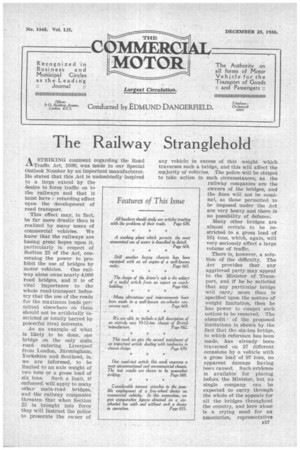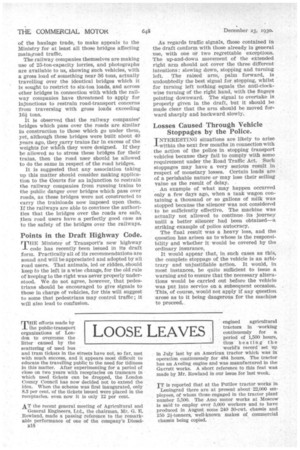The Railway Stranglehold
Page 31

Page 32

If you've noticed an error in this article please click here to report it so we can fix it.
A STRIKING comment regarding the Road -c---Traffic Act, 1930, was made in our Special Outlook Number by an important manufacturer. He stated that this Act is undoubtedly inspired to a large extent by the desire to force traffic on to the railways and that it must have r retarding effect upon the development of road transport.
This effect may, in fact, be far more drastic than is realized by many users of commercial vehicles. We know that the railways are basing great hopes upon it, particularly in respect of Section 25 of the Act, con'cerning the power to prohibit the use of bridges by motor vehicles. One railway alone owns nearly 4,000 toad bridges, and it is of vital importance to the whole road-transport industry that the use of the roads for the maximum loads permitted elsewhere on them should not be artificially restricted or totally barred by powerful rival interests.
As an example of what Is _likely to be done, one bridge on the only main road entering Liverpool from London, Birmingham, Yorkshire and Scotland, is, we are informed, to be limited to an axle weight of two tons or a gross load of six tons. Such a limit, if enforced, will apply to many other main-road bridges, and the railway contpanies threaten that when Section 25 is brought into force they will instruct the police to prosecute the owner of any vehicle in excess of this weight which traverses such a bridge, and this will affect the majority of vehicles. The police will be obliged to take action in such circumstances, as the railway companies are the owners of the bridges, and the fines will not be nominal, ac those permitted to be imposed under the Act are very heavy and there is no possibility of defence.
Many other bridges are almost certain to be re stricted to a gross load of 16i tons, which, again, will very seriously affect a large volume of traffic.
There is, however, a solution of the difficulty. The Act provides that any aggrieved party may appeal to the Minister of Transport, and if he be satisfied that any particular bridge will carry more than Is specified upon the notices of weight limitation, then he has power to compel such notices to be removed. The absurdit of the proposed limitations is shown by the fact that th-.3 six-ton bridge, to which reference has been made, has already been traversed on 27 different occasions by a vehicle with a gross load of 97 tons, no apparent damage having been caused. Such evidence is available for placing before the Minister, but no single company can be expected to carry, through the whole of the appeals for all the bridges throughout the country, and here alone Is a crying need for an association, representative of the haulage trade, to make appeals to the Ministry for at least all those bridges affecting main-,road traffic.
The railway companies themselves are making use of 25-ton-capacity lorries, and photographs are available to us, showing such vehicles, with a gross load of something near 36 tons, actually travelling over the identical bridges which it is sought to restrict to six-ton loads, and across other bridges in connection with which the railway companies have threatened to apply for injunctions to restrain road-transport concerns from traversing with gross loads exceeding 16i tons.
It is observed that the railway companies' bridges which pass over the roads are similar in construction to those which go under them, yet, although these bridges were built about 40 years ago, theuarry trains far in excess of the weights for which they were designed. If they be allowed so to stress these bridges for their trains, then the road user should be allowed to do the same in respect of the road bridges.
It is suggested that any association taking up this matter should consider making application to the Courts for an injunction to restrain the railway companies from running trains to the public danger over bridges which pass over roads, as these bridges were not constructed to carry the trainloads now imposed upon them. If the railways are able to convince the authorities that the bridges over the roads are safe, then road users have a perfectly good case as to the safety of the bridges over the railways.
Points in the Draft Highway Code.
THE Minister of Transport's new highway code has recently been issued in its draft form. Practically all of its recommendations are sound and will be appreciated and adopted by all road users. That animals, led or ridden, should keep to the left is a wise change, for the old rule of keeping to the right was never properly understood. We do not agree, however, that pedestrians should be encouraged to give signals to those in charge of vehicles, for this will suggest to some that pedestrians may control traffic ; it will also lead to confusion. As regards traffic signals, those contained in the draft conform with those already in general use, with one or two regrettable exceptions. The up-and-down movement of the extended right arm should not cover the three different intentions : slowing down, stopping and turning left. The raised arm, palm forward, is undoubtedly the best signal for stopping, whilst for turning left nothing equals the anti-clockwise turning of the right hand, with the fingers pointing downward. The signal to overtake is properly given in the draft, but it should be made clear that the arm should be moved forward sharply and backward slowly.
Losses Caused• Through Vehicle Stoppages by the Police.
TNTERESTING situations are likely to arise -I-within the next few months in connection with the action of the police in stopping transport vehicles because they fail to comply with some requirement under the Road Traffic Act. Such stoppages may have a very serious result in respect of monetary losses. Certain loads are of a perishable nature or may lose their selling value as the result of delay.
An example of what may happen occurred only a few days ago, when a tank wagon containing a thousand or so gallons of milk was stopped because the silencer was not considered to be sufficiently effective. The machine was actually not allowed to continue its journey until a better silencer had been obtained—a striking example of police autocracy.
The final result was a heavy loss, and the question has arisen as to whose is the responsibility and whether it would be covered by the ordinary insurance.
It would appear that, in such cases as this, the complete stoppage of the vehicle is an arbitrary and unjustifiable action. It would, in most instances, be quite sufficient to issue a warning and to ensure that the necessary alterations would be carried out before the vehicle was put into service on a subsequent occasion. This, of course, would not apply if any question arose as to it being dangerous for the machine to proceed. ,




























































































